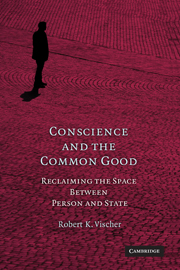1 - Conscience in Law
Published online by Cambridge University Press: 05 June 2012
Summary
Conscience is ubiquitous in our law, but it is usually unexamined, functioning as a presumed shared starting point within every citizen's cognitive grasp from which the law can do its work. The law's protection of conscience through a robust defense of individual liberty has been a hallmark of the American experiment, and no one can reasonably contest its success. But individual liberty only tells part of conscience's story. The danger is that a strictly individualized conception of conscience will obfuscate the need for society to defend the myriad relationships that are integral to conscience's full flourishing.
In this chapter, we will explore how modern law's understanding of conscience has provided a formidable bulwark against state encroachment on beliefs that are central to the individual's moral identity. The narrowness of this understanding, however, leaves our legal system ill equipped to handle many of today's disputes in which the cause of conscience is implicated. When viewed through the prism offered by the Supreme Court's most well-known interpretation of conscience, we can see that the law has already laid the groundwork for acknowledging conscience's relational dimension by focusing less on the source of conscience's claims and more on the authority of conscience's claims over the particular individual. In relation, though, the law's deliberately agnostic stance toward the source and nature of conscience's claims – verifying that an individual treats the claims as authoritative but venturing no further – may make it more difficult for the law to protect conscience proactively.
- Type
- Chapter
- Information
- Conscience and the Common GoodReclaiming the Space Between Person and State, pp. 15 - 47Publisher: Cambridge University PressPrint publication year: 2009



